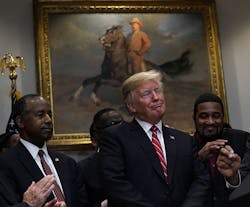China Ponders Scaling Back Tech Ambitions Due to Trump
China is considering plans to delay some targets in its strategy to dominate high-end technologies as it tries to ease trade tensions with America that have roiled financial markets.
Beijing may postpone some aspects of its ambitious industrial program by a decade to 2035, according to two people familiar with the matter who spoke on the condition of anonymity. The program that Chinese officials call "Made in China 2025," which seeks advancements in robotics, aerospace and renewable energy, has been one of the main targets in President Donald Trump's trade war.
Trump administration officials on Wednesday signaled that Beijing will have to do more to end the tariff war, with both Commerce Secretary Wilbur Ross and Treasury Undersecretary for International Affairs David Malpass calling on Beijing to agree on timelines, deadlines and enforceable actions to balance trade and open their markets to foreign companies.
"What you will see, if we do get to a trade agreement with China, is there will be verification procedures, there will be be enforcement mechanisms," Ross said on CNBC television. "We're talking about some fairly fundamental structural changes that over time will be needed to accomplish at least our end purposes."
Further Escalation
Beijing hasn't made a final decision on revising the Made in 2025 plan, and it's unclear whether it has communicated the idea to the Trump administration, the people familiar with the plan said.
Treasury Secretary Steven Mnuchin and Trade Representative Robert Lighthizer are working with China to strike a deal by March 1 that would avert a further escalation in tariffs, Council of Economic Advisers Chairman Kevin Hassett told Bloomberg Wednesday. They are making "a lot of positive progress, but have to wait and see where it all ends up," he said.
The Wall Street Journal first reported Wednesday on China's plans to give foreign companies greater access to its economy and that it was drafting a replacement to its Made in 2025 program, citing sources briefed on the strategy.
Stocks rallied globally on the improved outlook for U.S.-China trade, with U.S. equities gaining after the Journal story. The S&P 500 Index came off its highs of the day in afternoon trading -- continuing the volatility seen in recent sessions -- and was up 0.9% at 2:51 p.m. New York time.
A less aggressive technology plan could help address concerns raised by the Trump administration that Beijing unfairly subsidizes Chinese companies and steals American intellectual property. But the White House is skeptical whether Beijing is committed to making permanent changes to its policies, and is wary that changes to industrial strategy may amount to little more than a re-branding, according to one person familiar with the administration's thinking.
The evidence of China's commitment to a market-oriented economy will be in the implementation of those changes, Treasury's Malpass told lawmakers at a House hearing in Washington on Wednesday. "The proof is in the pudding," he said.
President Xi Jinping's government has taken steps this week to soothe the U.S., including a plan to cut tariffs on U.S. cars to 15% from 40%. China also intends to resume purchases of American soybeans soon, according to Chinese government officials. China said last week it would deepen reforms in the area of science and technology and put more effort into protecting intellectual-property rights.
Beijing launched Made in China 2025 in 2015, with the goal of becoming an advanced manufacturing leader within a decade. The initiative aims to develop local expertise in research and development and reduce the nation's reliance on foreign technology. It targets 10 emerging sectors, including robotics, clean-energy vehicles and biotechnology.

